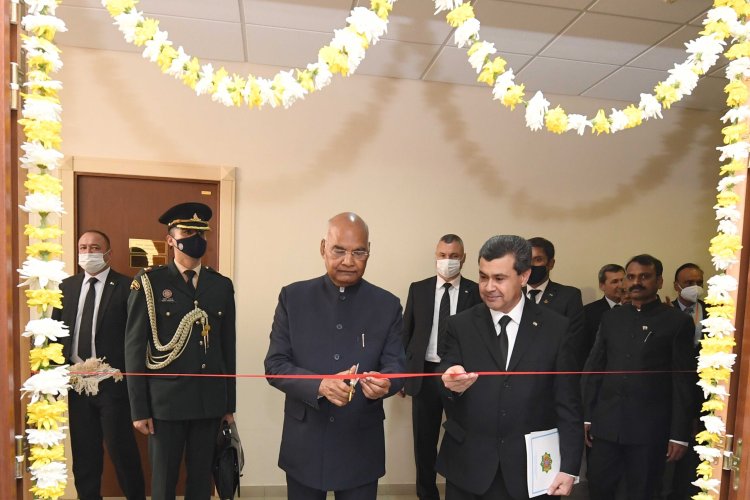भारत के लिए मध्य एशियाई देशों के साथ कनेक्टिविटी एक प्रमुख प्राथमिकता है |
भारत के राष्ट्रपति श्री रामनाथ कोविन्द ने कहा कि भारत के लिए मध्य एशियाई देशों के साथ कनेक्टिविटी एक प्रमुख प्राथमिकता है।

भारत के लिए मध्य एशियाई देशों के साथ कनेक्टिविटी एक प्रमुख प्राथमिकता है |
भारत के राष्ट्रपति ने अश्गाबात स्थित इंस्टीट्यूट ऑफ इंटरनेशनल रिलेशन्स में तुर्कमेनिस्तान के युवा राजनयिकों को संबोधित किया |
भारत के राष्ट्रपति श्री रामनाथ कोविन्द ने कहा कि भारत के लिए मध्य एशियाई देशों के साथ कनेक्टिविटी एक प्रमुख प्राथमिकता है।
उन्होंने आज (3 अप्रैल, 2022) अश्गाबात स्थित इंस्टीट्यूट ऑफ इंटरनेशनल रिलेशन्स में तुर्कमेनिस्तान के युवा राजनयिकों को संबोधित किया।
राष्ट्रपति ने कहा, “भारत अंतरराष्ट्रीय उत्तर-दक्षिण परिवहन गलियारे और अश्गाबात समझौता, दोनों का एक सदस्य है। हमने ईरान में चाबहार पत्तन के परिचालन के लिए कदम उठाए हैं, जो मध्य एशियाई देशों के लिए समुद्र तक एक सुरक्षित, व्यवहार्य और निर्बाध पहुंच प्रदान कर सकता है।”
उन्होंने आगे कहा कि कनेक्टिविटी का विस्तार करते हुए यह सुनिश्चित करना महत्वपूर्ण है कि इसकी पहल सभी देशों की संप्रभुता और क्षेत्रीय अखंडता के संबंध में परामर्शी, पारदर्शी और भागीदारीपूर्ण हो। राष्ट्रपति ने कहा कि भारत इस क्षेत्र में सहयोग, निवेश और कनेक्टिविटी निर्माण के लिए तैयार है।
राष्ट्रपति ने कहा कि आजादी के बाद से भारत की विदेश नीति लगातार विकसित हो रही है। विश्व की प्रमुख अर्थव्यवस्थाओं में से एक के रूप में भारत के उदय और भारत की तकनीकी क्षमताओं की प्रासंगिकता ने प्रमुख वैश्विक वार्ताओं को आकार दिया है। ग्लोबल साउथ (दक्षिणी अमेरिका, एशिया, अफ्रीका और ओसीनिया क्षेत्र) के देशों के साथ भारत की भागीदारी में काफी बढ़ोतरी हुई है और प्रमुख शक्तियों के साथ संबंध और भी अधिक गहरे हुए हैं।
राष्ट्रपति ने कहा कि हालिया वर्षों में भारत की विदेश नीति के प्रमुख स्तंभों में से एक "पहले पड़ोसी" की नीति रही है। अपने पड़ोसियों के साथ भारत के जुड़ाव का व्यापक दर्शन यह सुनिश्चित करना है कि वे भी हमारे आर्थिक विकास और वृद्धि से लाभान्वित हों।
इस प्रकार हमारी ‘पहले पड़ोसी’ नीति का ध्यान कनेक्टिविटी को बढ़ाना, व्यापार व निवेश का संवर्द्धन और एक सुरक्षित व स्थिर पड़ोस की रचना करना है। उन्होंने आगे कहा, “हाल ही में 'हिंद-प्रशांत (इंडो-पैसिफिक)' भू-राजनीतिक शब्दावली को जोड़ा गया है, लेकिन इस क्षेत्र के साथ भारत का जुड़ाव कई सदियों से रहा है। इस क्षेत्र की गतिशीलता और जीवन शक्ति इसे एक वैश्विक आर्थिक केंद्र बनाती है। हम हिंद-प्रशांत क्षेत्र में एक खुली, संतुलित, नियम-आधारित और स्थिर अंतरराष्ट्रीय व्यापार व्यवस्था के पक्ष में हैं।”
राष्ट्रपति ने कहा कि पिछले कुछ वर्षों में भारतीय विदेश नीति के प्रमुख क्षेत्रों में से एक मध्य एशियाई देशों के साथ हमारे ऐतिहासिक संबंधों का पुनरोद्धार रहा है, जो हमारे 'विस्तारित पड़ोस' का एक हिस्सा हैं। विकासशील देशों के रूप में भारत और मध्य एशियाई देश एकसमान परिप्रेक्ष्य और दृष्टिकोण साझा करते हैं। हम आतंकवाद, उग्रवाद, कट्टरपंथ और नशीले पदार्थों की तस्करी आदि जैसी सामान्य चुनौतियों का सामना करते हैं। भारत के अधिकांश मध्य एशियाई देशों के साथ सामरिक संबंध भी हैं।
यूक्रेन में जारी संघर्ष पर राष्ट्रपति ने कहा, “इस मुद्दे पर भारत की स्थिति दृढ़ और तार्किक रही है। हमने इस बात पर जोर दिया है कि मौजूदा वैश्विक व्यवस्था अंतरराष्ट्रीय कानून, संयुक्त राष्ट्र चार्टर और क्षेत्रीय अखंडता व राज्यों की संप्रभुता के सम्मान में निहित है। हम बिगड़ती मानवीय स्थिति को लेकर बेहद चिंतित हैं। हमने हिंसा और शत्रुता को तत्काल समाप्त करने और बातचीत व कूटनीति के रास्ते पर लौटने का आह्वान किया है। हमने यूक्रेन को मानवीय सहायता भी प्रदान की है।”
राष्ट्रपति ने कहा कि संयुक्त राष्ट्र सबसे अधिक सार्वभौमिक और प्रतिनिधि अंतरराष्ट्रीय संगठन के रूप में बना हुआ है। बहुपक्षवाद में सुधार के लिए भारत के आह्वाहन के मूल में संयुक्त राष्ट्र सुरक्षा परिषद का सुधार है, जो समकालीन वास्तविकताओं को प्रतिबिंबित करता है। इस संदर्भ में भारत एक सुधार और विस्तार की गई संयुक्त राष्ट्र सुरक्षा परिषद में हमारी स्थायी सदस्यता के लिए तुर्कमेनिस्तान के समर्थन को महत्व देता है।
राष्ट्रपति ने कहा कि जैसे-जैसे तुर्कमेनिस्तान 'अरकाडग वाले लोगों के युग' में आगे बढ़ रहा है, भारत एक दीर्घकालिक मित्र के रूप में लोगों के सामूहिक सपनों को साकार करने को लेकर इसके साथ साझेदारी करने के लिए तैयार है। उन्होंने उम्मीद व्यक्त की कि तुर्कमेनिस्तान की उनकी यात्रा दोनों देशों के बीच साझेदारी को और बढ़ावा देने के लिए एक नई गति प्रदान करेगी।
इस अवसर पर राष्ट्रपति ने इंस्टीट्यूट ऑफ इंटरनेशनल रिलेशन्स में एक 'इंडिया कॉर्नर' का भी उद्घाटन किया। 'इंडिया कॉर्नर' की परिकल्पना भारत से संबंधित गतिविधियों के आयोजन में संस्थान के छात्रों के बीच भारत में रुचि उत्पन्न करने के लिए की गई है। भारत सरकार ने 'इंडिया कॉर्नर' के लिए कंप्यूटर, भारत पर पुस्तकें, संगीत वाद्ययंत्र और अन्य सामग्रियां प्रदान की हैं।
इससे पहले दिन की शुरुआत में राष्ट्रपति ने अश्गाबात में पीपुल्स मेमोरियल परिसर का दौरा किया और इटरनल ग्लोरी (अनंत महिमा) के स्मारक पर माल्यार्पण किया। इसके अलावा उन्होंने बाग्यारलिक खेल परिसर का भी दौरा किया, जहां उन्होंने महात्मा गांधी की प्रतिमा के सामने पुष्पांजलि अर्पित की। साथ ही, भारतीय प्रशिक्षक की देखरेख में तुर्कमेनिस्तान के लोगों का योग प्रदर्शन देखा।
राष्ट्रपति कल सुबह (4 अप्रैल, 2022) को तुर्कमेनिस्तान और नीदरलैंड की अपनी राजकीय यात्रा के अंतिम चरण में नीदरलैंड के लिए रवाना होंगे।
Connectivity with Central Asian countries is a major priority for India.
The President of India addressed the young diplomats of Turkmenistan at the Institute of International Relations in Ashgabat.
The President of India, Shri Ram Nath Kovind said that connectivity with Central Asian countries is a major priority for India.
He addressed the young diplomats of Turkmenistan today (April 3, 2022) at the Institute of International Relations in Ashgabat.
The President said, “India is a member of both the International North-South Transport Corridor and the Ashgabat Agreement. We have taken steps to operationalize Chabahar Port in Iran, which can provide a safe, viable and seamless access to sea for Central Asian countries.”
He further said that while expanding connectivity, it is important to ensure that its initiatives are consultative, transparent and participatory with respect to the sovereignty and territorial integrity of all countries. The President said that India is ready to cooperate, invest and build connectivity in the region.
The President said that India's foreign policy has been continuously evolving since independence. India's rise as one of the world's major economies and the relevance of India's technological capabilities have shaped major global negotiations. India's engagement with the countries of the Global South (South America, Asia, Africa and Oceania region) has increased significantly and relations with major powers have deepened.
The President said that one of the key pillars of India's foreign policy in recent years has been the policy of "neighbor first". The overarching philosophy of India's engagement with its neighbors is to ensure that they too benefit from our economic growth and development.
Thus the focus of our 'Neighbourhood First' policy is to enhance connectivity, promote trade and investment and create a safe and stable neighbourhood. He further said, “The geopolitical term ‘Indo-Pacific (Indo-Pacific)’ has been added recently, but India’s association with this region has been there for many centuries. The dynamism and vitality of the region make it a global economic hub. We are in favor of an open, balanced, rules-based and stable international trading system in the Indo-Pacific region."
The President said that one of the key areas of Indian foreign policy over the years has been the revitalization of our historic ties with Central Asian countries, which are a part of our 'extended neighbourhood'. As developing countries, India and Central Asian countries share similar perspectives and perspectives. We face common challenges like terrorism, extremism, radicalization and drug trafficking etc. India also has strategic relations with most of the Central Asian countries.
On the ongoing conflict in Ukraine, the President said, "India's position on this issue has been firm and rational. We have emphasized that the current global order is rooted in international law, the United Nations Charter, and respect for the territorial integrity and sovereignty of states. We are deeply concerned about the deteriorating human condition. We have called for an immediate end to violence and hostility and to return to the path of dialogue and diplomacy. We have also provided humanitarian aid to Ukraine."
The President said that the United Nations remains the most universal and representative international organization. At the heart of India's call for reform of multilateralism is the reform of the UN Security Council, which reflects contemporary realities. In this context, India values Turkmenistan's support for our permanent membership in a reformed and expanded UN Security Council.
The President said that as Turkmenistan moves into the 'era of the Arkadag people', India stands ready to partner with it to realize the collective dreams of the people as a long-term friend. He expressed hope that his visit to Turkmenistan would provide a new impetus to further boost the partnership between the two countries.
The President also inaugurated an 'India Corner' at the Institute of International Relations on the occasion. The 'India Corner' is envisaged to generate interest in India among the students of the Institute in organizing India related activities. The Government of India has provided computers, books on India, musical instruments and other materials for 'India Corner'.
Earlier in the day, the President visited the People's Memorial Complex in Ashgabat and laid a wreath at the Monument to Eternal Glory. In addition, he also visited the Bagyarlik Sports Complex, where he paid floral tributes in front of the statue of Mahatma Gandhi. Also, saw the yoga performances of the people of Turkmenistan under the supervision of an Indian instructor.
The President will leave for the Netherlands tomorrow morning (April 4, 2022) on the final leg of his state visit to Turkmenistan and the Netherlands.

































